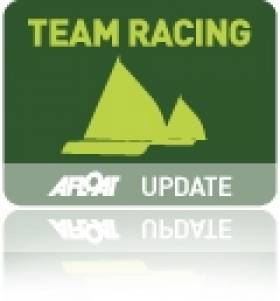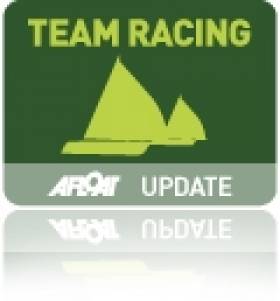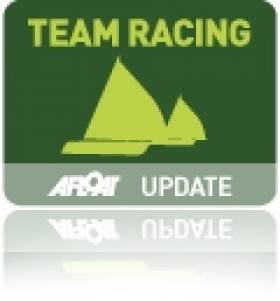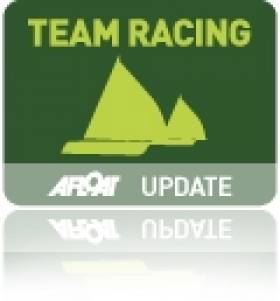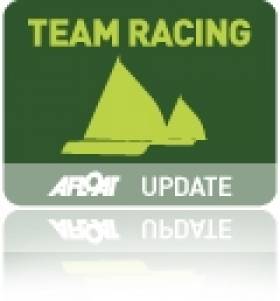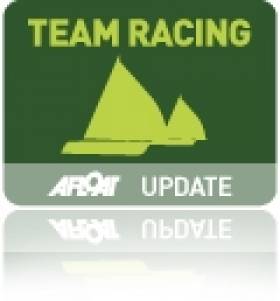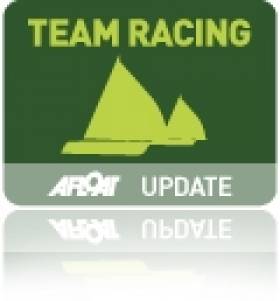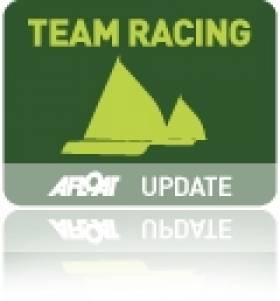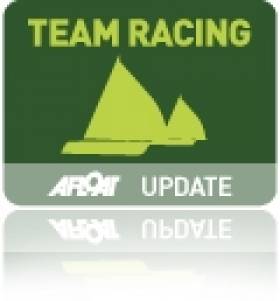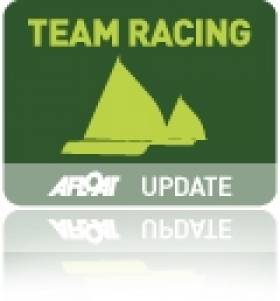Displaying items by tag: Team Racing
Team Racing Championships Completes 170 Races To Crown Local Champions in Schull, West Cork
#teamracing – The Irish Team Racing Nationals were held over the 8th and 9th November 2014 in Schull, West Cork. Following a great weekend, 170 races using 4 flights (24 boats) 21 teams competed for the National championships. A Schull Alumni team won the national title and comprised Mark Hassett with crew Liam Manning, Fionn Lyden with crew Michelle Morgan and Oisin O'Driscoll with crew Katie Moynihan.
Three teams from the UK travelled across to be part of a sunny, 10 to 15 knots from the NW weekend, with the top 18 Irish teams.
For the first round, teams were seeded into three leagues of seven teams, after 63 races the top three teams from each league were placed in the Gold league the next two teams from each league placed in the Silver league and the last two from each league placed in the Bronze league.
For the second round, Nine teams sailed in the Gold league to seed the teams for the quarter finals, with the Silver and Bronze doing the same to seed the teams for the semi-finals.
Following the Quarter finals four teams came out on top, two Irish and two English
Oxford & Cambridge
Schull Alumni
Wessex Exempt
Gladiators
Following very close semi finals Oxford & Cambridge and Wessex Exempt went through to the Final with Schull Alumni and Gladiators paired off to fight it out for the National Champions
Wessex Exempt took the title and Schull Alumni the National Champions
Schull Alumni team
Mark Hassett with crew Liam Manning
Fionn Lyden with crew Michelle Morgan
Oisin O'Driscoll with crew Katie Moynihan
British Crews Eye Up Irish Team Racing Nationals At Schull
#teamrace– The Irish Team Racing Association 2014 National Championships will be sailed in Schull on 8th-9th November. The event will be run by the Fastnet Marine and Outdoor Education Centre using their fleet of TR3.6 boats.
Several British teams have expressed their intention to make the trip to West Cork.
There will be a Youth prizes, with a separate knock-out stage if more than 3 Youth teams enter.
Youth is defined as under 18 on December 2014 - so that sailors in this section will meet the age requirements for the 2015 Worlds
In order to provide the best facilities possible, and to ensure that we have invited enough personnel, including umpires please return the attached pre-entry form with the required deposit before Monday 6th October. Only teams that have pre-entered by that ate will be guaranteed entry to the championships.
#TeamRacing - Schull Sharks have been crowned British Schools Team Racing Champions for the third time in a row at the BSDRA Nationals at Rutland earlier this week.
Twenty-two teams took part at this year's nationals from 30 June to 2 July, which were held at Rutland Water for the first time.
Light airs were the name of the game for most of the event, with huge shifts and periods with no wind at all, but for the finals a nice 10 to 15 knots filled in from the north-east.
Irish Team Racing Nationals champs Schull Sharks, along with two teams from Florida in the USA and a team from Berlin, Germany, made up the international entries.
The West Cork sailors' first race was a lottery start to the event, which took three times longer than normal to complete due to the lack of wind.
Winchester College just won at the finish, but this was the last race Schull didn't take, as they went on to win their group and progress to the finals.
Schull were up against the USA in the semi-finals, where they won all three races and progressed to the final against the UK favourite Magdalen College, where again they won all three races.
Top form from Munster team racers has produced second overall at a 2k team racing event in Italy. Three days of brilliant sunshine and great breeze set the backdrop for the most dramatic of 2K events. Teams from Italy, The Netherlands, Germany and Ireland gathered for what the international jury described as the closest racing the series has seen all year.
Day 1 saw the Cork Racing Team in blistering form, winning 6 of their 7 round robin races, and losing only to the Rome Racing Team.
DAY 2 was comprised of 8 hours on the water, 6 races, 5 wins. This left us 2nd overall in the Gold Fleet standings.
Day 3 started with a light breeze which quickly filled to a steady force 3, flat water, and 25 degrees under a cloudless sky.
In semi final 1, The Royal Cork Yacht Club met the seasoned Dutch Team, fresh from a winter of team and match racing.
Race 1, and a pre start error by the Dutch gives the lead to the Irish... Undeterred, the Dutch got back into the action only to watch the Irish team with great boat speed, take an easy 1-2. Declining to change boats, the Dutch quickly turned the tables in race 2 leaving the score 1-1. Race 3 goes to the Irish and their first slot in a 2K finals.
The all Italian semi final proved to be the shoot out all had expected with protest flags flying even before the prep. With positions changing on every leg, the young Roman team of Saverio Ramirez and Edoardo Scotti Mancinelli finally took the 3rd and final race to win 2-1, and the Italian Championships.
With time running out the Irish now entered the fray against the exuberant Romans. A poor start by Italy set the scene for an easy win....and so it was till the last 50 meters. With Scotti spinning, all was down to Ramirez, who started what was the most exciting of dog fights, some six penalty turns later and the Italians gained the inside at the pin, and locked the Irish out to win 2-3. The time limit of 4PM cancelled the chance of a best of three final, and so, the Italians took the title this time.
1st Reale Circolo Canottiere Tevere Remo
2nd Royal Cork Yacht Club
3rd Dutch Match and Team Racing Association
4th Yacht Club Costa Smeralda
5th Circolo Nautica Velo Argentario
6th Banana Race Team
7th AFAP Sailing
8th Bavaria Yacht Club
2k Cork Team Competes at Italian Team Racing Event
#teamracing – A Royal Cork 2K Racing Team skippered by George Kingston and Fred Cudmore compete at the Royal Club Tevere Remo in Rome today. After scoring fourth place at the last event at Yacht Club de Monaco, the team are ready for three days of intense racing.
The Cork team pictured above are: Fred Cudmore, George Kingston, Sarah O'Leary, Sonia Minihane, Phil O'Leary, Sean Cotter, Emma Geary and Ian McNamee
Top Marks to Schull in School Team Racing Nationals
#schoolsailing – Local team 'Schull Sharks' were winners of the Irish Schools Sailing Association Team Racing National Championships held in Schull Bay, West Cork from May 3–4. UK visiitng team PBC were second but in a show of strength for West Cork team racing a further two Schull teams took third and fourth. Rathdown Girls School from Dun Laoghaire were next followed by Mt. Anville, Gonzaga and then Blackrock College.
Full results are attached for download as a pdf file.
Although it was hoped this year to host the Nationals in Dublin, a clash of dates resulted in the Schull venue for 2014. If clubs are in a position and would like to host this event in 2015 please contact [email protected]
#teamracing – Located in central England near Leicester and Peterborough, the 2015 ISAF Team Racing Worlds will be held at Rutland Sailing Club on Rutland Water.
Following a bid process, the ISAF Team Racing Sub-committee made a recommendation to the ISAF Executive Committee who approved the choice of Rutland.
ISAF Competitions Manager Jon Napier said "Rutland Sailing Club has a strong team racing heritage and passion for the discipline. With an exceptional infrastructure in place we look forward to working with the Organising Authority to deliver a successful event."
The 2015 ISAF Team Racing Worlds are provisionally scheduled for July 2015.
Two Irish Teams Contest British Team Racing Trophy
#wilsontrophy – Two Irish teams will contest The Wilson Trophy British Open Team Racing Championships are to be held on West Kirby's Marine Lake this weekend (9th – 11th May) and will be hosted by West Kirby Sailing Club (WKSC). Dublin teams from Howth Yacht Club and the Royal St. George YC are travelling to Liverpool for the event now in its 65th year. This unique and spectacular team race sailing event will be welcoming 32 of the finest teams from around the UK, USA and Ireland including three teams from WKSC itself.
Aswell as the Irish participating teams, there will be two Irish umpires at the event. Irish national umpire Cxema Pico is attending and International Judge and national umpire Gordon Davies in also on duty.
The 192 competitors will be sailing in 12-foot dinghies known as Fireflies while under the close observation of some of the best umpires from the UK and overseas. Competition will be fierce this year as some of the traditional teams have disbanded, with sailors joining other teams to try and find that winning formula.
Racing starts at 1pm on Friday 9th May and continues through to late Sunday afternoon. Weather permitting, there will be over 350 fast and cut throat races to watch. The Marine Lake, otherwise known as the 'theatre of dreams', provides a natural amphitheatre where members of the public are encouraged to come and watch the action from the Grandstand on West Kirby promenade (by the old baths). The Visitors Centre and live commentary will also help to explain some of the nuances of the racing to spectators and passers-by.
David Taylor, Commodore of West Kirby Sailing Club, said: "We are thrilled to be hosting this fantastic event, now in its 65th year. It's great to see so many people travelling from near and far to sail on the Marine Lake and enjoy its beautiful surroundings.
"The club is extremely proud to host this event each year and we always aim to provide both the competitors and our local community with a weekend of sporting action that they won't forget."
The three-day event will be an exciting and fun weekend for spectators and competitors alike with a thrilling demonstration of top level sailing, which is free to watch. The final rounds are scheduled to take place on Sunday from 1pm, when the action reaches its climax, with the top eight of 32 teams entering play-offs to take home the celebrated trophy.
The 2014 Wilson Trophy is delighted by the support it has received from many individuals and businesses, including leading sponsors: Carlsberg, Everite Windows, GJW Direct, MI Finance and Speed Medical.
Follow the results at: www.wilsontrophy.co.uk
Howth Yacht Club & Royal St. George Team Racers To Represent Ireland At Wilson Trophy
#teamracing – This year Irish team racing hopes of success at the Wilson trophy rest on the shoulders of Howth Yacht Club and the Royal St. George YcC The highlight of the team racing calendar is next month when the top team racing nations make the journey to West Kirby to compete for the coveted trophy from 9 - 11 May.
HYC will be represented by Simon Rattigan, Geoff Tait and Darragh O'Connor as helms and Lynn Reilly, Lisa Tait and Emma Geary as respective crews. The team have been training hard this year and have shown good results in recent events - finishing in 2nd place in the Irish Team Racing Nationals and 1st place in the Trinity Invitational Trophy. A strong performace at The Wilson will certainly round off good season for HYC.
There will also be a Royal St George team competing at the Wilson Trophy, to be captained by Marty O'Leary - maintaining the tradition that dates back to the first ever edition of this event.
The Wilson Trophy, hosted by the infamous West Kirby Sailing Club, is the most prestigious team racing event in the world attracting 32 of the most competitive International teams. It is the most sought after prize within the world of team racing, in which HYC aims to continue to build a strong presence.
The team is targeting a quarter-final placing having narrowly missed out on this in the last number of editions
Gonzaga College Wins Leinster Schools Team Sailing Championships
#teamracing – Top marks to Gonzaga College for its win in the Leinster Schools Team Racing championships. Nine teams from across Leinster battled it out last weekend in Dun Laoghaire Harbour for the title of Leinster Schools Champions. The Royal St George Yacht Club hosted the event and the School teams were quick to grips with the club's fireflies. The event had to be postponed the weekend before with Southerly gales preventing any sailing which was especially unfortunate as 5 of the original 14 team entry could not make the rescheduled event.
A steady 12 knot Easterly wind allowed racing to start at 10:45, which was a relief to all given the 40 odd knot gust the previous Saturday.
Race 1 saw last years runners up Gonzaga race Blackrock College who were new to event this year. Blackrock quickly showed that they had good speed and tactics but ultimately could not break down a 1-2 combination and lost 3,4,5. Race 2 saw another new team to the event, Gormanstown College compete against a combined Bray Schools team. This race was decided on the finish with Gormanstown holding their nerve to finish 2,3,5.
Racing continued non stop throughout the day with OOD Graham Elmes competing the 36 race round robin shortly after Lunch.
Mt Anville won the Round with an impressive 7 wins out of 8, only being beaten by the other all girl school at the event Rathdown College. Gonzaga finished with 6 out of 8, ahead of Blackrock (5/8) and Rathdown (5/8).
With time running out, a final and a petit final were sailed. As the winds dropped the sailors needed all their skills to get the boats around the course with the ever watchful Umpire Team ready to rule on any Rule 42 violations.
Gonzaga won both races in the best of three final with 1,2 combinations forcing a somewhat deflated Mt Anville team to settle for second place. Blackrock won their petit final against Rathdown with two convincing 1,3,4 combinations.
These top four teams have now qualified to represent Leinster at the all Ireland Schools Championshis to be held in Schull on the weekend of May 3rd
Results :
1. Gonzaga College S.J.
2. Mount Anville
3. Blackrock College
4. Rathdown
5. St. Andrews


























